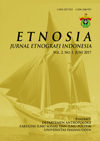Abstract
Wahdah Islamiyah (WI) is a community organization (ormas) based in Makassar under the aupices of Yayasan Pesantren Wahdah Islamiyah (YPWI). Members of WI are the followers of Salafi, a social movement which tries to practice Islamic values according to the understanding of As-Salaf As-Shalih. While members of WI consists of men and women, this article is focused on how female members of WI practice the ideal values of womenhood set by WI in the every day life. The research findings indicates that members of WI consist of three categories, namely: new members, teachers (murabbi), and administrative staff of its Lembaga Muslimah WI. The value of womenhood is set by the organization, and is classified into three, namely how to dress properly, how women behaves towards the opposite sex, and how ‘to become a wife/mother’. The application of such values is not always syncronised with the ideal ones, depending on their level of membership and which value and which condition faced by the members. While new members tend to have a space for negotiation; murabbi is more advance than new members in the practice of womenhood values, which can be seen from how they dress (ber-hijab) and how they interact with the opposite sex; staff of Lembaga Muslimah WI is focused on how to practice such values in relation to how ‘to become a wife/mother’. Thus, women transform themselves spiritually on the basis of womenhood values as they become part of the organization and the level of their membership.References
Abdullah, Adil Fathi. 2001. Menjadi Ibu Ideal. Jakarta: Pustaka Al-Kautsar.
Al-Balagh. 2016. Bahaya Mengumbar Aurat (edisi 40) Makassar: Wahdah Islamiyah Makassar.
Badawi, Jamal, A. 2008. Kedudukan Wanita Dalam Islam. http://raudhatulmuhibbin.blogspot.com, diakses tanggal 27 November 2016.
Berkovitch, Nitza. 1997. Motherhood as a National Mission: The construction of Womanhood in the Legal Discourse in Israel, sciencedirect.com, diakses tanggal 20 Maret 2017.
Blackburn, Susan. 2008. 'Indonesian Women and Political Islam,' Journal of Southeast Asian Studies, Februari, 39(1):83–105.
Darajat, Zakiah. 1992. Kesehatan Mental dalam Keluarga. Jakarta: Pustaka Antara.
Deed, Lara. 2006. An Enchanted Modern: Gender and Public Piety in Shi‘i Lebanon. Princeton: Princeton University Press.
Deller, Ruth A. 2015. ‘Religion as Makeover: Reality, Lifestyle and Spiritual Transformation’, http://journals.sagepub.com/doi/pdf/10.1177/1367877913513687, diakses tanggal 23 Desember 2016.
Engineer, Asghar Ali. 1992. The Rights of Women in Islam. Delhi: Sterling Publishers.
Harlan, Sarah V. 2014. ‘Two is Enough’: Rights-Based Family Planning in Indonesia. k4health.org, diakses tanggal 25 Oktober 2016.
Jahan, Ishrat (2015). ‘The Social Construction of ‘Self’ and Womanhood in a Hindu Village of Bangladech’, Journal of World Anthropology, 3(1):42-51.
Mernissi, Fatema. 1991. Women and Islam: An Historical and Theological Enquiry. Oxford: Basil Blackwell.
Nisa, Eva F. 2012. Cadari of Wahdah Islamiyah: Women as Dedicated Actors of Ultra-conservatism. http://intersections.anu.edu.au/issue30/nisa.html, diakses tanggal 25 Oktober 2016.
Nizmi, Yusnarida Eka. 2015. ‘Pandangan Amerika Terhadap Perempuan Muslim PascaSeranganSebelas September 2001’, Jurnal Kajian Politik dan Masalah Pembangunan, 11(1):1623-1632.
Qibtiyah, Alimatul. 2012. ‘The Conceptualisation of Gender Issues among Gender Activists and Scholars in Indonesian Universities’,
http://intersections.anu.edu.au/issue30/qibtiyah.htm#n3, diakses tanggal 15 April 2017.
Rachman, Budhy M. 2002. ‘Penafsiran Islam Liberal Atas Isu-isu Gender dan Feminisme di Indonesia’, dalam S.R. Dzulhayatin, B. Munawar-Rachman, N. Umar (eds.), Rekonstruksi Metodologis Wacana Kesetaraan Gender dalam Islam. Yogyakarta: Pustaka Pelajar, 27-81.
Rinaldo, Rachel. 2008. 'Envisioning the Nation: Women Activists, Religion and the Public Sphere in Indonesia,' Social Force, Juni, 86(4):1781–1804.
Robinson, Kathryn. 2006. 'Islamic Influences on Indonesian Feminism,' Social Analysis, 50(1): 171–77.
------------------------. 2008. 'Islamic Cosmopolitics, Human Rights and Anti-Violence Strategies,' Anthropology and the New Cosmopolitanism P. Werbner (ed.), Oxford, New York: Berg, 111–134.
------------------------. 2009. Gender, Islam and Democracy in Indonesia. London and New York: Routledge.
Siddiqui, Samana. 2010. What's Wrong with MuslimSsocieties: A Critical Look at How We Treat Women. soundvision.com, diakses tanggal 20 Maret 2017.
Stacey, Aisha. 2013. Does Islam Oppress Woman? islamreligion.com, diakses tanggal 20 Maret 2017.
Sugiyarto, Wahid. 2013.‘Al Wahdah Al-Islamiyah: Radikalisme dan Komitmen Kebangsaan’, Harmoni: Jurnal Multikultural & Multireligius, 12(1):86-99.
Syam, Mirawati dan Idrus, Nurul Ilmi. 2017. ‘Butta Kodi, Biné Kodi’: Gender, Stigma dan Dampaknya Terhadap Tu Tamanang di Kabupaten Gowa, Etnosia, 2(2):30-44.
Zine, Jasmine. 2002. 'Muslim Women and the Politics of Representation,' American Journal of Islamic Social Sciences, 19(4): 1–22.
Tasnim, Nur. 2012. Motherhood and Islam: The Reverred, the Bad, and the Mystical. Patheos.com, diakses 25 Oktober 2016.
Umar, Nasaruddin. 1999. Argumen Kesetaraan Gender: Perspektif Al-Qur’an. Jakarta: Paramadina.
Wieringa, Saskia E. 2009. 'Women Resisting Creeping Islamic Fundamentalism in Indonesia,' Asian Journal of Women's Studies, http://www.aletta.nu/epublications/iav_b00103571.pdf, accessed 9 December 2011.
Wadud, Amina. 1993. Women in the Qur’an: Rereading a Sacred Text From a Woman’s Perspective. Oxford: Oxford University Press.
https://hizbut-tahrir.or.id/2013/08/30/barat-justru-merendahkan-wanita/ 20 Mei 2017.
https://id.wikipedia.org/wiki/Wahdah_Islamiyah diakses tanggal 23 Mei 2017.
http://wahdahmakassar.org/gerakan-penentang-hijab-dan-kiat-membendungnya/diakses tanggal 23 Oktober 2016.
http://wahdahmakassar.org/hak‐dan‐kewajiban‐istri/ diakses tanggal 23 Oktober 2016.
http://wahdahmakassar.org/hijab‐wanita‐muslimah‐1/ diakses tanggal 23 Oktober 2016.
http://wahdahmakassar.org/syarat‐dan‐ketentuan‐hijab‐yang‐sesuai‐syariat‐islam/ diakses tanggal 23 Oktober 2016.
http://wahdahmakassar.org/resep‐jitu‐menjaga‐kehormatan‐muslimah/ diakses tanggal 23 Oktober 2016.
http://wahdahmakassar.org/wanita‐cobaan‐bagi‐kaum‐pria/ diakses tanggal 23 Oktober 2016.
http://wahdah.or.id/mengatur‐jarak‐kelahiran/ diakses tanggal 23 Oktober 2016.
http://wahdah.or.id/rasulullah-shallallahu-alaihi-wa-sallam-juga-biasa-membantu-pekerjaan-isteri-isterinya/ diakses tanggal 23 Oktober 2016.
http://wahdah.or.id/wanita‐bekerja/ diakses tanggal 23 Oktober 2016.
http://www.wahdahtamalate.com/p/sejarah-singkat-berdirinya-wahdah.html diakses tanggal 23 Januari 2017.





